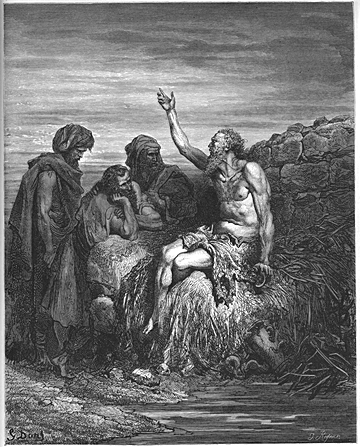Hiob 2
1 Gbe bubu gbe la, dziƒodɔlawo va do ɖe Yehowa ŋkume eye Satana hã va do kpli wo ɖe Mawu ƒe ŋkume.
On another day, the angels came again and gathered together in front of Yahweh, and Satan came too.
2 Yehowa bia Satana be, “Afi ka nètso va do?” Satana ɖo eŋu be, “Metso tsatsa ge le anyigba dzi eye menɔ yiyim, nɔ gbɔgbɔm le edzi.”
Yahweh asked Satan, “Where have you come from?” Satan replied, “I have come from the earth, where I have been traveling back and forth, seeing what is happening.”
3 Tete Yehowa bia Satana be, “Èlé ŋku ɖe nye dɔla Hiob ŋua? Ame aɖeke mele anyigba dzi de enu o, enye ame maɖifɔ kple ame dzɔdzɔe, ame si vɔ̃a Yehowa eye wòtsri vɔ̃. Togbɔ be ède adã menye ɖe eŋu be magblẽ edome esi mewɔ naneke o hã la, egalé eƒe blibodede la me ɖe asi ko.”
Yahweh asked Satan, “Have you (noticed/thought about) my [faithful] servant Job? He is very godly/righteous [DOU], he greatly respects/reveres me, and he [always] avoids doing evil things. And he still acts in a very godly/righteous manner, even though you persuaded me to [let you] cause disastrous things to happen to him for no reason.”
4 Satana ɖo eŋu na Yehowa be, “Ŋutilã ɖe ŋutilã teƒe, ekema ame atsɔ nu sia nu si le esi la katã ana ɖe eƒe agbe ta.
Satan replied to Yahweh, “He praises you only because you bless him [IDM]. People will give up everything they have to save their own lives.
5 Do wò asi ɖa eye nàtu nu kple eƒe ŋutilã kple eƒe ƒuwo, ekema nàkpɔe ɖa be mado ɖiŋu na wò le wò ŋutɔ wò ŋkume o mahã?”
But if you harm his body [MTY], he will surely curse you openly [IDM]!”
6 Yehowa gblɔ na Satana be, “Enyo ŋutɔ. Kpɔ ɖa, ele asiwò me, gake mègaka asi eƒe agbe ya ŋu o.”
Yahweh replied to Satan, “(All right/Okay), you may do to him whatever you want to do, but do not cause him to die.”
7 Ale Satana dzo le Yehowa ŋkume hekplɔ abi vɔ̃ɖi aɖewo ƒu Hiob, tso eƒe afɔgɔme va se ɖe eƒe dzodome.
So Satan left, and he caused Job to be afflicted with very painful boils, from the top of his head to the soles of his feet.
8 Tete Hiob tsɔ ze kakɛ nɔ ŋuti kum esi wònɔ anyi ɖe afi me.
Job took a piece of broken pottery and scraped the boils on his skin, and he sat in ashes [as people did when they were mourning for those who had died].
9 Srɔ̃a va egbɔ biae be, “Ɖe nègalé wò blibodede la me ɖe asi koa? Do ɖiŋu na Mawu ne nàku!”
His wife said to him, “Are you still trying to (be loyal to/faithfully trust in) God? You should curse God, and then you will die.”
10 Hiob ɖo eŋu nɛ be, “Èle nu ƒom abe nyɔnu bometsila ene. Ɖe míaxɔ nu nyuiwo ko tso Mawu gbɔ eye menye vɔ̃ hã oa?” Le nu siawo katã me la, Hiob mewɔ nu vɔ̃ le eƒe nuƒoƒo me o.
But Job replied, “You talk like people who do not know God talk. (Should we accept only the good things that God [does for us]?/We should not accept only the good things that God [does for us].) [RHQ] We should also accept bad things.” So in spite of all these [things that happened to] Job, [he] did not say anything against God.
11 Esi Hiob xɔlɔ̃ etɔ̃awo, Temanitɔ Elifaz, Suhitɔ, Bildad kple Naamatitɔ, Zofar se dzɔgbevɔ̃e siwo katã dzɔ ɖe Hiob dzi la wodze mɔ tso woƒe aƒewo me le ŋkeke si woɖo ɖi la dzi be woaɖafa nɛ eye woafa akɔ nɛ.
Among Job’s friends were Eliphaz from Teman [town], Bildad from Shuah [land] and Zophar from Naamah [land]. When they heard about all the terrible things that had happened to Job, they left their home areas and went together to Job to console/comfort him [DOU].
12 Esi wokpɔe le adzɔge la, womete ŋu dze sii o, ale wowo avi gboo kple ɣli, wodze woƒe awu ʋlayawo eye wolɔ ke kɔ ɖe tame.
When they saw Job from a distance, they almost did not recognize him. They wailed loudly, they tore their robes, and they threw dust over their heads [to show how sorry they were because of what had happened to Job].
13 Ale wonɔ anyi ɖe egbɔ le anyigba ŋkeke adre kple zã adre sɔŋ. Ame aɖeke mebia nya aɖekee o elabena wokpɔ ale si wònɔ veve semii.
Then they sat on the ground with Job for seven days. None of them said anything to Job, because they saw that he was suffering greatly, [and they did not think that anything that they said would lessen his pain].





















